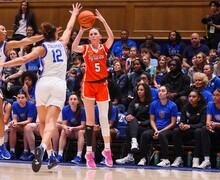Catchphrase: College vocabulary influenced by pop culture
Michelle Buchwalter says she uses the word ‘dunzo’- as in ‘over’ or ‘finished’- a few times a week.
Those scrambling for their Merriam-Webster dictionaries shouldn’t expect to find anything – it’s a made-up word made popular by the cast of ‘Laguna Beach.’
Buchwalter also uses acronyms like ‘BFF’ and ‘TTYN’ (‘talk to you never’). ‘I used to make fun of (Paris Hilton’s show), but it sticks,’ said Buchwalter, a junior broadcast journalism major at Syracuse University.
Television has always been credited with sparking trends – the ‘Rachel haircut’ copied from ‘Friends,’ the ‘Sex and the City’ Cosmo, and more recently, Lauren Conrad-inspired headbands – but catchphrases also become popular after they’re on TV.
‘People are admired for being creative, which is often how slang words come into place,’ said William Ritchie, an associate professor of linguistics.
‘Probably the greatest of all time would be Homer Simpson’s ‘d’oh,” said Robert Thompson, a television, radio and film professor and the director of the Bleier Center for Television and Popular Culture at SU. ‘I mean, that’s now in the Oxford dictionary of the English language. And it’s a really useful word. We don’t quite have anything in the English language that expresses that kind of exasperation.’
Even ‘meh,’ also of ‘The Simpsons’ fame, was added to the Collins English Dictionary.
Today’s frequently used TV-derived catchphrases include ‘bromance’ (thank you, Brody Jenner), ‘That’s what she said’ (oh, Michael Scott) and ‘spotted’ (as in ‘Spotted: At the steps of the Met, an S and B power struggle’) from ‘Gossip Girl.’
Sarah Tepper, a sophomore sport management major, said she uses TV words like ‘spotted’ once in a while.
‘I don’t think I use them seriously,’ she said.
Going back a few years, there was ‘fierce’ from ‘Project Runway’ and Ashton Kutcher’s ‘punk’d,’ as well as the trend of the ‘McDreamy-McSteamy’ code names.
While most of the time these words are thought of as having been born on TV, that’s usually not the case.
‘Bromance,’ in fact, was around long before MTV popularized it. The term was heavily used to describe the relationship between Turk and J.D. on ‘Scrubs.’ But urbandictionary.com credits its debut to Dave Carnie, then-editor of Big Brother magazine, who used it to describe skateboarders who spend all their time together.
”Yadda yadda’ was already a phrase though (‘Seinfeld’) gets credit for it, but it existed long before that,’ said Thompson.
Even ‘do’h’ can be found prior to its fame (the Oxford English Dictionary notes that it can be found in a 1945 BBC radio transcript and in the 1952 book ‘Jennings & Darbishire’ by Anthony Buckeridge), but it wasn’t until 2001, after the show made it popular, that it was incorporated into the dictionary.
The TV origins of many other trendy words and phrases have also been misattributed.
‘Let’s hug it out,’ for example, is thought to be a classic product of ‘Entourage.’ But according to urbandictionary.com, the phrase was uttered on a ‘Friends’ episode a few years before Kevin Connolly and Jeremy Piven were on TV together.
There are rumors in online forums that the phrase ‘That’s what she said’ has been around since the ’60s, but before it made its way unto ‘The Office,’ it was heard in a 1992 ‘Saturday Night Live’ skit of ‘Wayne’s World’ (‘I’m getting tired of holding this’ … ‘That’s what she said!’).
Words from TV infiltrating into the English language is nothing new, Thompson says.
‘You had new words being developed in the age of radio and early television that of course spread across the entire demographic,’ he said.
According to Thompson, there currently seems to be no specific demographic using these words and phrases most often; it just depends on the shows’ audiences.
While catchphrases from TV easily enter regularly used English, it’s not as easy for words and phrases made popular by movies to do the same.
‘The advantage of TV is that it plays over and over and over again,’ said Thompson. ‘A movie gets released, gets talked about, people hear it, and then it doesn’t go away, because obviously it continues to play on DVD and cable and all the rest of it, but the reason ‘truthiness’ manages to make its way into the vocabulary is because (Stephen) Colbert keeps using it, and it’s on four nights a week, and it’s on week after week after week.’
‘Truthiness’ (‘truth that comes from the gut, not from books’) was the American Dialect Society’s 2005 Word of the Year winner, and it won a similar award from Merriam-Webster in 2006.
Thompson says this constant repetition of TV shows can be compared to the success of TV advertising, which plays the same jingles and mottos over and over on commercials to associate them with a certain product.
‘I use (words from TV), but I don’t associate them with a TV show, I pick them up from my friends that are saying them,’ said Sarah Trad, a sophomore majoring in film.
Like TV-inspired fashions or obsessions with TV hunk George Clooney, catchphrases aren’t in style forever.
‘Spongeworthy was (a ‘Seinfeld’ phrase) that worked for a while but has begun to fade out a bit,’ said Thompson. ”Master of your domain’ is another ‘Seinfeld’ one.’
‘If we go beyond just single words, then of course the list is very long,’ Thompson said.
Published on February 22, 2009 at 12:00 pm





